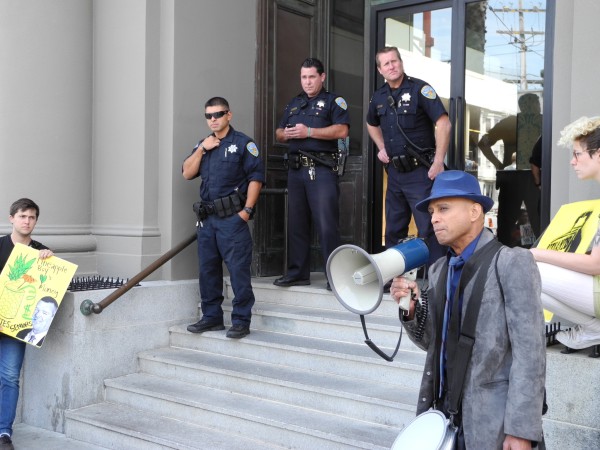
By Tim Redmond
SEPTEMBER 3, 2014 – A local real-estate speculator has dropped his effort to evict four Duboce Street tenants under the Ellis Act after a series of protests and direct actions brought unwanted attention to Michael Harrison and Vanguard Properties.
Harrison, operating through the company Pineapple Boy LLC, was trying to throw out Benito Santiago and three others at 149-151 Duboce. Santiago, a musician who teaches in the San Francisco Public Schools, became an outspoken foe of the Ellis Act and has helped organize demonstrations against evictions all over the city.
In the most recent action, protesters descended on Vanguard’s Mission Street Office and demanded a halt to the eviction. Harrison is a co-founder of Vanguard.
The noisy action caused some bad behavior by the realty folks and attracted a fair amount of press.
And this week, Harrison informed the tenants that he was withdrawing the Ellis Act eviction and putting the building up for sale.
Santiago’s lawyer, Matt McFarland of the Tenderloin Housing Clinic, told me that the tenant organizing was a key factor in forcing Harrison to drop the Ellis Act case. “We didn’t win this in court,” he said.
Nothing against the great work the McFarland and his colleagues do, but he agreed the protests played a big role.
“This win shows us that direct action has direct effects, and that organizing can and does actually keep people in their homes,” Erin McElroy, on organizer of the Anti-Eviction Mapping Project, said.
It’s tough to fight an Ellis Eviction in court – not impossible, but difficult. The state law essentially allows a building owner to “go out of business” by clearing out all of the tenants in a rental property.
It’s used by speculators who buy buildings with tenants in them, clear out the occupants, and then resell the place at a huge markup as tenancies in common.
Harrison has done several previous Ellis Act evictions.
But the attention that organizers have brought to this case can’t have been pleasant for Vanguard, and while we’ll never know for sure (he hasn’t returned my phone calls), it’s entirely possible that Harrison just decided this particular bit of speculation wasn’t worth the hassle.
That’s an important message: The law on its face may be against tenants, but that doesn’t mean it’s hopeless. Every protest, every statement, every action that calls attention to the people who are throwing longtime San Franciscans onto the streets for quick profits, can have an impact. And if it happens enough, and the targets find that the tenants aren’t going quietly, we may see the Ellis eviction tide start to turn.
Of course, this struggle may not be over — someone else is going to buy Santiago’s building. Organizers are hoping to work with the San Francisco Land Trust to see if the place can be kept from future speculators, but at least any potential buyer will be on notice: Another Ellis Act attempt won’t be easy.




